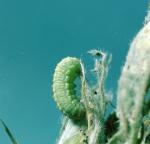COLUMBIA, Mo. – Alfalfa weevil, a major pest of a prime hay crop, died out across central Missouri this spring. Credit the weather, says a University of Missouri Extension entomologist.
“Warm, wet weather favors fungal pathogens that kill the weevil,” says Wayne Bailey. “Two days near 80 degrees brought out the pathogens.”
Producers across southern Missouri weren’t so lucky.
“In cool weather, alfalfa weevil had a devastating effect,” he said.
Bailey thinks the fungal disease will travel with weevils to northern Missouri as warm weather returns. “But weevils have fooled me before,” he said.
Southern growers had alfalfa emerging early. And there were more hatches of weevils. “There were fall-laid eggs, winter-laid eggs, followed by spring-laid eggs,” Bailey says.
Weevils are most damaging on first-cutting alfalfa hay crops.
When scouting early, growers may have a hard time seeing the larvae. The youngest larvae stay inside the alfalfa growing tip. By the third and fourth instars, larvae are larger and crawl out to feed on leaves. They become easy to see.
By the time larvae emerged in central Missouri, the pathogens were ready. “Scouting reports the first week of May showed 90 percent kill rates by the fungus.”
Biological controls can wipe out alfalfa weevils in 72 hours. Infected weevil larvae become lethargic. Next, the lime-green worms turn a sickly yellow, Bailey says. The larvae die in a short time.
Alfalfa growers who find sick weevils should not spray. The pathogens will do their work.
In southern Missouri, recommended pesticide sprays did not work this spring, Bailey says. “Approved pesticides work best when temperatures reach 60 degrees. The weevils go to work at 48 degrees and that leaves a huge window that favors the bugs.”
In a May 2 MU Extension teleconference, regional agronomist Sarah Kenyon said some growers sprayed alfalfa fields four times. Based in Alton, Mo., Kenyon works in counties closest to Arkansas.
Recent scouting shows parasitic wasps were starting work across central Missouri. “The three species of wasps are about 20 percent effective,” Bailey says. “They add more potential for killing the pests.”
When alfalfa weevil, a foreign pest, first arrived in Missouri, it killed many alfalfa stands. In the last decade, pathogens and parasites caught up with the invaders. Natural controls reduce costs of raising the high-value forage crop.
Regional agronomists at MU Extension centers offer help in identifying crop pests.
Recommended weevil controls will be in a newsletter Bailey is writing. Growers can sign up for the electronic letter at extension centers.
The MU entomologists are part of the College of Agriculture, Food and Natural Resources, Columbia.
Read more http://extension.missouri.edu/news/DisplayStory.aspx?N=1823





